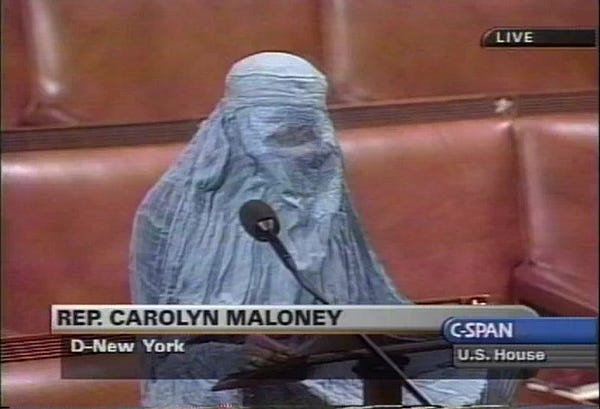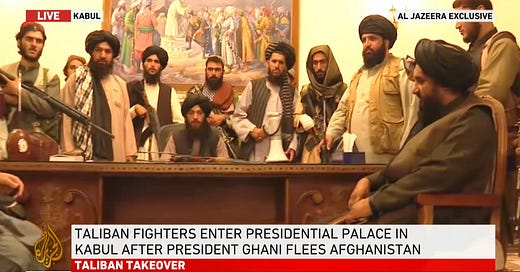The Lies the Pundits Keep Telling Us About Afghanistan
So much of the outrage about the U.S. withdrawal is built on fantasies that pundits won't stop peddling.
The Taliban's now-completed takeover of Afghanistan is demonstrating two things very clearly: the disastrousness of the 20-year U.S. war in Afghanistan and the inability of our political and media systems to cope with that disaster.
There are scenes of real tragedy playing out right now as the U.S. beats a hasty retreat to the exits and the Taliban consolidates its rule over Afghanistan. The Taliban's brutality is no joke; there are very justified fears about what the future holds for Afghans, especially women, and it is vital that the rest of the world, especially the U.S., opens its doors as widely as possible for Afghan refugees.
But let us not pretend that the outrage of so many media and political elites truly stems from concern for the plight of Afghans. This is about American humiliation, and a fundamental unwillingness to grapple with the truth about what the U.S. and its allies have been doing in Afghanistan since 2001.
There have been many comparisons between the U.S. flight from Kabul and the ignominious American withdrawal from Vietnam in 1975—so much so that Secretary of State Antony Blinken was forced to insist that the world was not witnessing a Saigon sequel.
Blinken was wrong, of course. This is like Saigon, because the lesson of Saigon was that the Vietnam War had been a horrendous catastrophe—one that could never end in anything but American humiliation and defeat. The U.S. had been meddling in the region for decades, embedded itself in Vietnam on a trumped-up pretense and with little dissent, widened and widened its military presence, committed endless atrocities, propped up puppet governments, and in the end, none of it was a match for a fighting force that was actually rooted in the country and would not be dislodged, or for a public that grew to understand the madness of what it was being asked to support. Does any of that ring a bell?
Judging by much of the news coverage, it doesn't ring enough of a bell for a lot of people in the upper echelons of the media world, who seem to be shocked by what is occurring. None has been more shocked than Axios' Mike Allen. In his Monday newsletter, he wrote that "The Taliban's lightning seizure of Afghanistan's capital yesterday exposed stunning failures of American intelligence, imagination and execution that will be studied as long as people study history." This was a virtual repeat of Allen's Sunday newsletter, in which he opined that Afghanistan was a "stunning failure for the West, and embarrassment for Biden." Message received: Mike Allen thinks this was a "stunning failure."
Why is Allen stunned by what we are witnessing? You can certainly make a case that nobody expected the Taliban to take over quite so quickly, but it has been clear for years and years where this was headed. It has been at least two years since the Washington Post published a landmark investigative series about how thoroughly bad things were in Afghanistan—and how successive American administrations, including ones that Joe Biden has been a part of, had simply lied to the world about it. It was all there, from the inadequacy and corruption of the Afghan security forces to the billions of wasted dollars. This is not secret material. It wasn't being hidden from Mike Allen, or the New York Times' Declan Walsh, or NBC's Richard Engel, or any of the other media bigwigs who pronounced themselves simply shocked by what we are seeing.
The chaos and violence we are witnessing are just a small part of the chaos and violence we have embedded so deeply in Afghanistan. Our 20 years of war has led directly to this moment, and whether or not the withdrawal itself could have been done differently (one lesson might be "don't confidently say there will never be any Saigon-style imagery on your watch unless you are actually sure of that") the fundamental nature of what is going on was not avoidable. This is what happens when you lose a war. This is what it looks like when you are defeated.
But too many in our media cannot seem to admit this, and too many outlets are rolling out the red carpet for the usual gallery of unrepentant hawks. In the Washington Post, Max Boot called the withdrawal "the worst U.S. foreign policy failure since the fall of Saigon in 1975," which would be news to anyone with even a passing familiarity with the Iraq War, and wondered (yet again) why the U.S. couldn't just keep troops in Afghanistan forever. NPR decided it was a good idea to ask John Bolton what he thought. In the Atlantic, Tom Nichols told readers, "Afghanistan is your fault," castigating the American people for demanding an end to the war:
Biden was right, in the end, to bite the bullet and refuse to pass this conflict on to yet another president. His execution of this resolve, however, looks to be a tragic and shameful mess and will likely be a case study in policy schools for years to come. But there was no version of “Stop the forever war” that didn’t end with the fall of Kabul. We believed otherwise, as a nation, because we wanted to believe it. And because we had shopping to do and television to watch and arguments to be had on social media.
So Biden was right to end the war but Americans are still the villains because we care about shopping. Makes sense. Maybe what is happening is the fault of the people who have presided over this calamity for 20 years?
This psychotic effort to prolong a multi-decade obscenity—or to place responsibility for its downfall into the hands of ordinary citizens rather than governments—is symbolic of an elite that is lying to itself, and to us, about what has happened in Afghanistan. And that is before you get to the biggest lie of them all: that we've been in this for The Girls. Here's Richard Engel again:

It is unquestionably heartbreaking to think about what the Taliban might inflict on women and girls, but let us dispense with this fantasy that the U.S. has been in Afghanistan to support women, or to build democracy, or to strengthen Afghan institutions, or any of the other lines that are deployed whenever someone has the temerity to suggest that endless war and occupation is a harmful thing.


We did not go into Afghanistan to support its people, and we did not stay in Afghanistan to support its people. It is astonishing, given what we know about the monsters that the U.S. has propped up time and time again around the world, that the myth persists that we do anything out of our love for human rights. We went in and we stayed in for the same reason: the American empire is a force that must remain in perpetual motion.
Admitting that the presence of the United States causes harm is not acceptable. The catastrophes we bring with us create the justifications for further catastrophes. Wars can never be allowed to end, even when the U.S. is given a great chance.

So many pundits are confident that the U.S. withdrawal from Afghanistan will shame us in the eyes of history. But the real shame was that we were in Afghanistan to begin with, and an even greater shame would have been that we refused to do the right thing and get the hell out.





